Case Study: Lockheed Martin HD Satellite Bearings

Background
Lockheed Martin designs and manufactures advanced technology systems and products for the aerospace industry. Their new Expedite program involved the development of a satellite fitted with next-generation high-definition cameras. They were working with The Aerospace Corporation, a non-profit FFRDC organization, on a project to reduce volatile contaminants close to the camera’s lens. Both companies were concerned that the cameras would be compromised if volatiles settled near the lens and fogged it up.
Challenge
- Can Nye decrease the outgassing rate of both Rheolube® 2000 and Rheolube® 2004?
- Can this project be completed in time for the satellite launch?
Solution
Rheolube® 2000LO & Rheolube® 2004LO
- A stripping procedure was developed by Lockheed Martin and Nye.
- Daily samples were rushed to The Aerospace Corporation to evaluate.
- Nye purchased a vacuum oven that was large enough and could pull the required vacuum level to treat the lubricant. Nye modified the vacuum oven to control and monitor heat precisely.
- Tests to confirm the extreme requirements of the lubricants were performed by Nye, Lockheed Martin and The Aerospace Corporation.
| Product | Chemistry | Temp Range (°C) | Oil Separation (24 hrs @ 100°C) | Outgassing (45°C/ 72 Hours/ 80K) |
|---|---|---|---|---|
| RHEOLUBE 2000LO | Cyclopentane / Sodium Soap | -45 to 125 | 3.3% | 6.0 ×10-10 g/cm2 /s Maximum |
| RHEOLUBE 2004LO | Cyclopentane / Sodium Soap | -45 to 125 | 0.1% | 6.0 ×10-10 g/cm2 /s Maximum |
Results
The result of all these efforts was the birth of Rheolube® 2000LO and Rheolube® 2004LO. Both are sodium complex soap thickened, cyclopentane greases intended for aerospace and vacuum instruments. The project was a huge success. According to an unclassified report by a Lockheed Martin employee the “Stripped Grease is Awesome.” Nye demonstrated to Lockheed Martin our “can do attitude.”
Ready to learn more? Contact Us.


